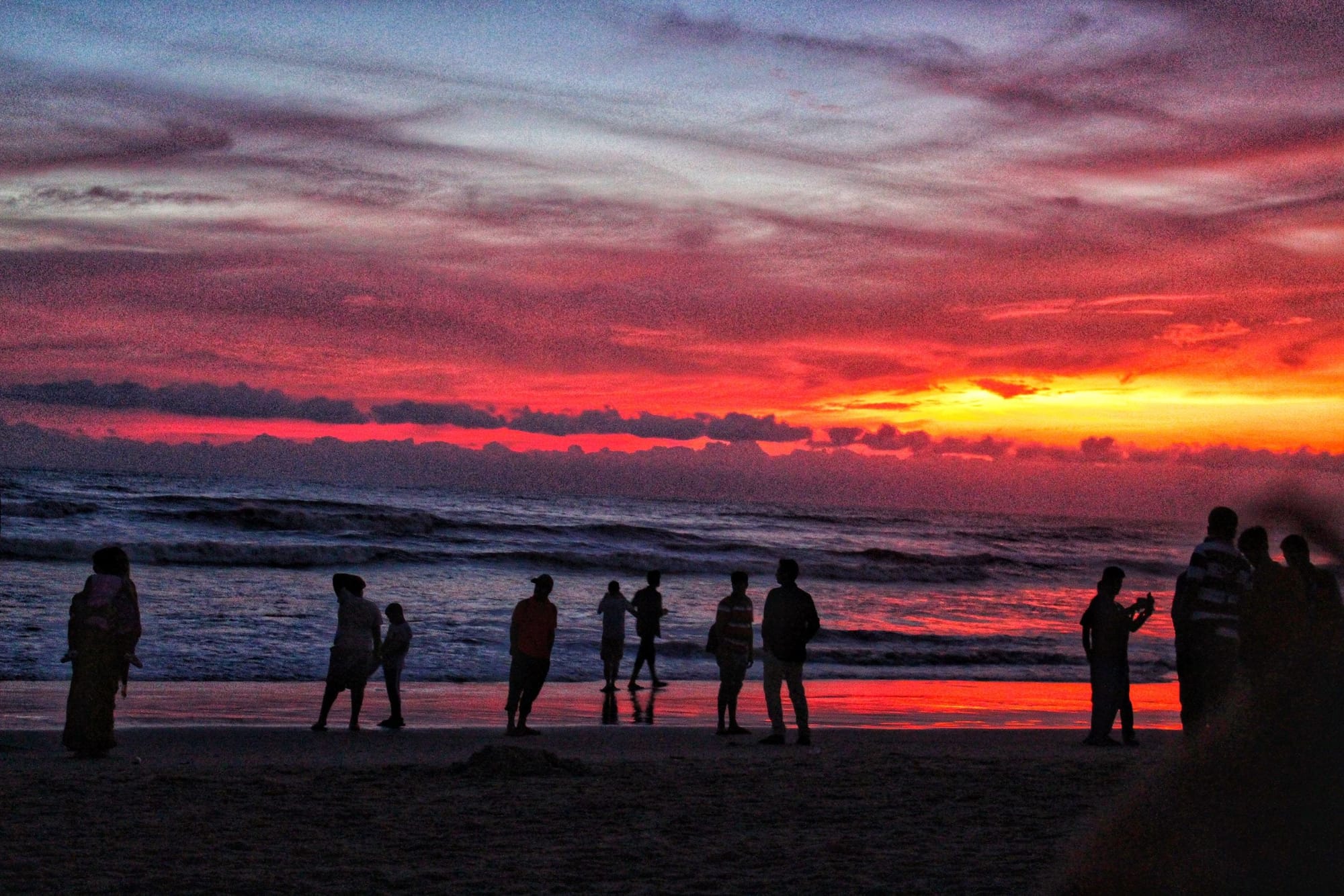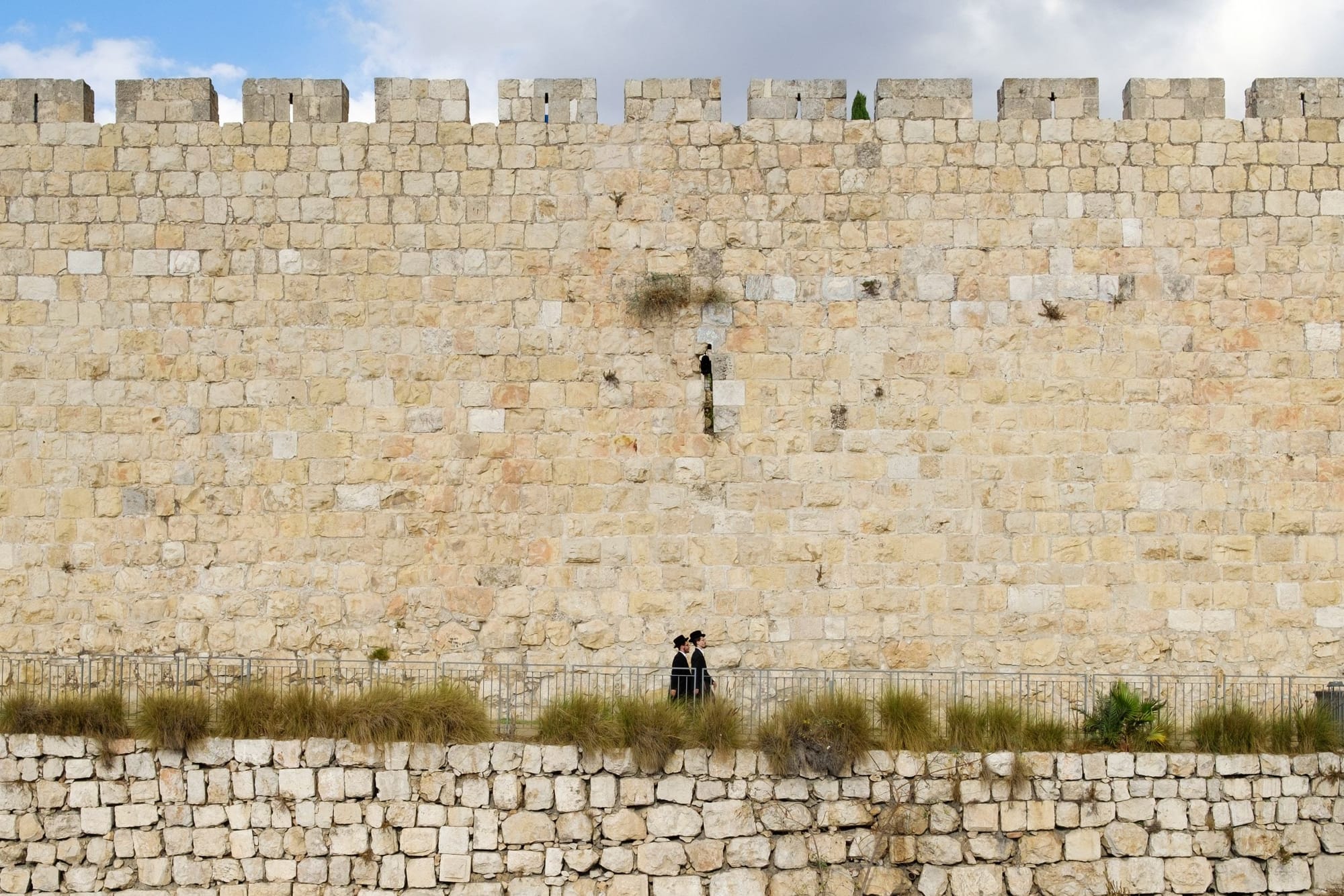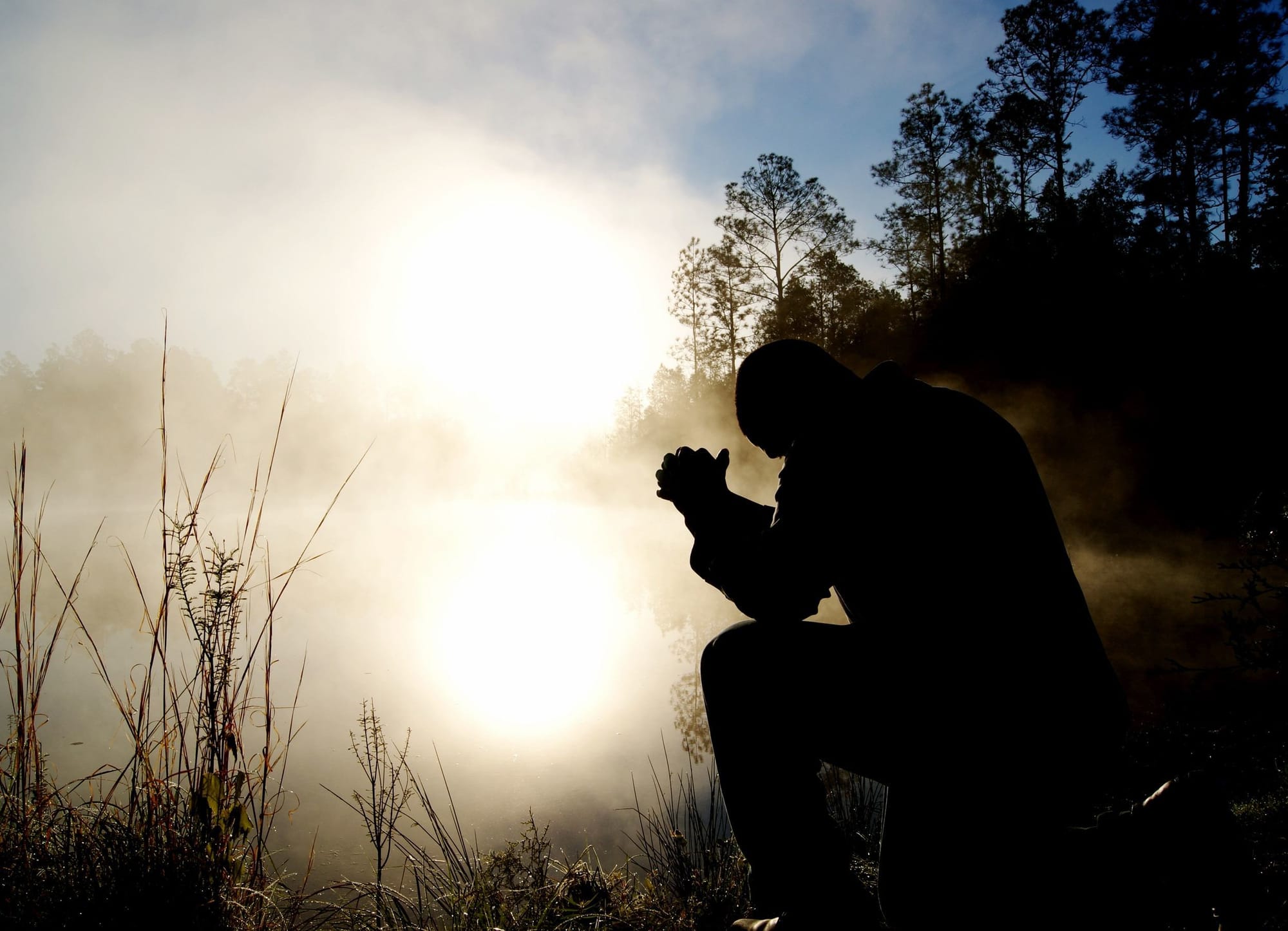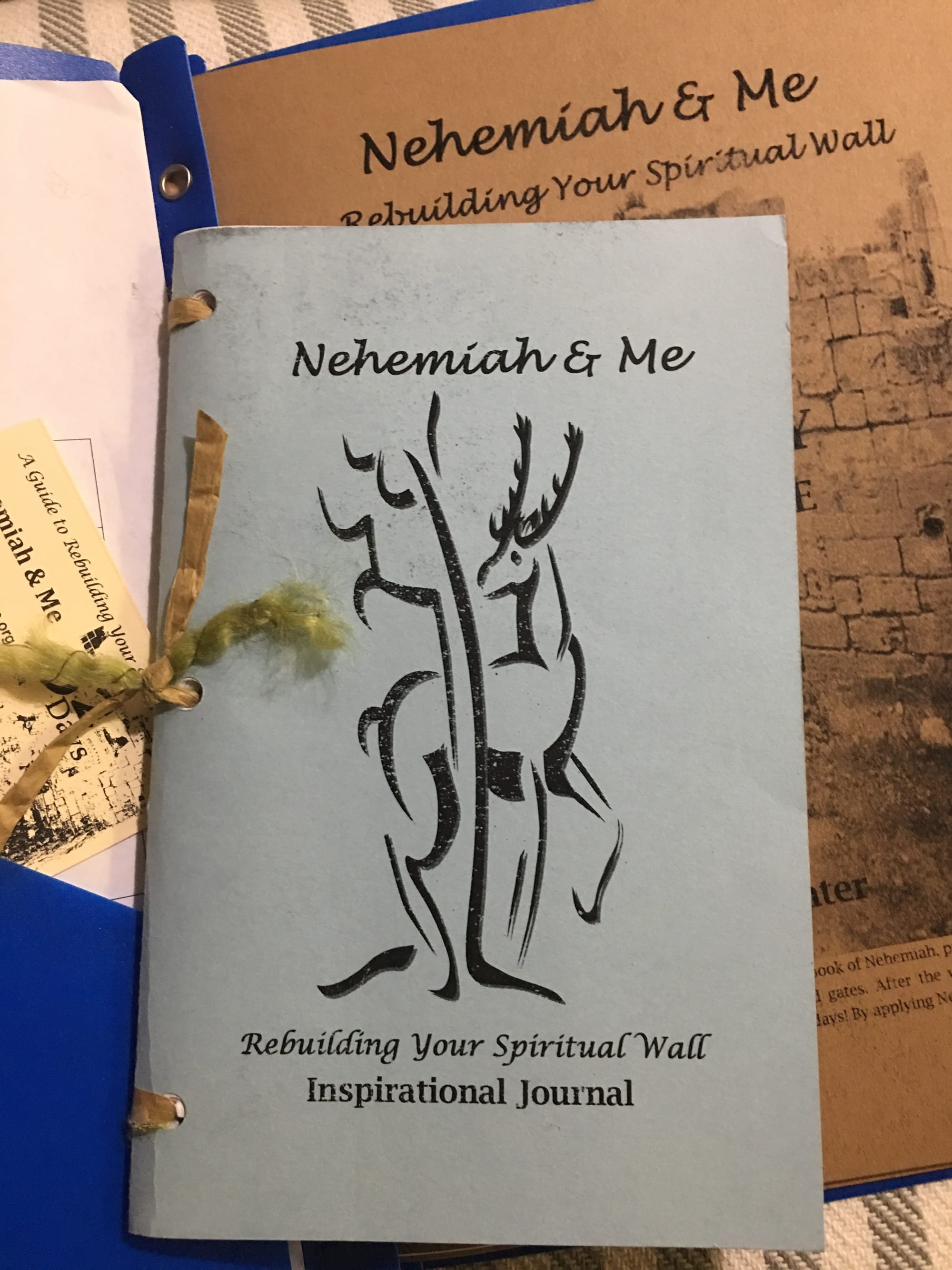Nehemiah Chapter 1 * Good Grief

Nehemiah Chapter 1
To Mex & Back
"Good Grief"
Reflecting on when I had sold or stored almost everything to move to Rosarito to be with my daughter and her family, I remember how I hated the rushed three-day road trip. No radio, no air-conditioning. I sang and talked to my two pets and myself the whole way, trying hard to maintain a positive attitude. Truthfully, I was depressed and scared. Unlike the adventurous soul I had been in my 20s and 30s, even 50s, when I turned 62, something changed.
I literally saw myself preparing to leave Lincoln, Nebraska, as someone cowering under the table, clinging to the table leg, refusing to budge while reason took hold to pull me through the door. I wanted to go, but I really wanted to stay. I still don’t understand why I had such a hard time letting go, even letting go of the steering wheel.

During the 1700-mile drive, I gripped the steering wheel so hard, my knuckles turned white. I was afraid I might lose control of the car—or my life. And, I prayed often, comparing my situation to the disciples whom Jesus had sent into towns, taking only their sandals, no money, no food, no extra clothing. “Well, LORD,” I said, “I’ve also left everything. Guess I can really relate to your disciples now.”
Transitioning to life in Rosarito was another story. It took weeks before I explored the city on my own. It took even longer before I quit being so negative. My daughter even remarked that she didn’t recognize the person I had become. One day I prayed, “Jesus, please give me Your sight; I wanted to see the ocean and people of Rosarito from Your perspective, not mine.” Immediately, my burden lifted. It might sound corny or cliché, but that’s the truth. After that, I was pulled and pushed by the LORD to give up old fears and let Him take the lead, and He led me to Calvary Chapel Rosarito.
More than half of Playas Santa Monica, where I lived, also attended Calvary Chapel. I started going to weekly Bible studies in the neighborhood and at church. When my friend, Michael Hanson, planned to teach First and Second Peter, I jumped at the chance to sign up for a college-Bible course. Since I had always wanted to study the word of God. Calvary Chapel College in Rosarito offered the perfect opportunity.

Two years later, I prepared to return to Nebraska, due to hip problems. At the same time, I was nearing the end of a course on Nehemiah, taught by my neighbor and friend, Pastor Michael Hanson. Because of what Nehemiah had accomplished for the LORD in 52 days by rebuilding the wall of Jerusalem, I decided to apply Nehemiah’s blueprints to rebuild my physical and spiritual life. Nehemiah’s #1 rule was to pray before planning; #2, pray during planning; and #3, pray whenever he encountered obstacles or opposition.
Prayer usually took place as a conversation between Nehemiah and God. I loved it! Nehemiah also kept a journal, that accounted for the narrative tone of the book. “I wept. I prayed. I was sad.” One verse that caught my attention was his confession, “I was the cupbearer for the king.” We’ll explore the huge implications of that text later.
I credit the lessons learned from Nehemiah for helping pull off my return trip to Nebraska without a glitch. Whenever I doubted what I was doing or if I was crazy, I re-read Nehemiah, and every verse spoke to me like a dear friend.
Back in Nebraska, finding an affordable apartment, getting the ball rolling on medical services, and unpacking, I related everything to Nehemiah. What started out as a physical rebuilding of my life, turned into the restoration of my spiritual wall; a wall I was just learning about. When you read Chapter 1, you’ll learn the importance Nehemiah and his countrymen placed on the Jerusalem wall.
Jerusalem had been their home, their connection to God, even when they had turned away from God. In a way, my feelings about leaving Lincoln compared to the Israelites who were forced to leave their beloved land when they were marched into captivity. Even though God provided for them—homes and gardens—they missed their city. I discovered after I moved from Lincoln, I missed all the things that used to drive me crazy when I lived there—the humidity, hot summers and bone-chilling winters, and of course, I missed family and friends. When I moved from Rosarito, the reverse played out. I missed the tropical weather, Calvary Chapel, my family and friends, and the ocean. When I had first arrived in Rosarito, my daughter assured me that I’d love the ocean, I told her, “Not me! I mean, what’s the big deal about the ocean anyway?” I soon learned.

The Green Flash
Every night, like clockwork, half the neighborhood and many of the people from church would gather in God’s backyard to watch the sunset. If I was in my house and noticed the colored ribbons in the sky, shades of purple, peach and pink, then it was time to drop what I was doing and race to the beach a block away. When I reached the wall, it was like something out of a movie. No matter where I looked, there would be neighbors—the Hansons, Maria, the Koois, the Johnsons, Thaddeus and Daniel and my grandchildren would be sitting on or leaning against the wall built to separate the sand from the boardwalk. On the beach there might be children playing volleyball, softball, or Frisbee. Some neighbors sat on their balconies, eyes glued on the ocean. We were all addicted to God’s sunset, surrounded by His glory.
One of my favorite memories is Jeff Johnson telling us, “Now, watch for the green flash!” And he’d point at the sun dipping below the horizon. Almost simultaneously, on some nights, as the sun disappeared, a flash of green would shoot up into the sky and immediately fizzle out like a Fourth of July bottle rocket. Night after night, I squinted at the setting sun until I was blind, but truthfully, I never saw the green flash, until I began to see it through Jeffery’s eyes.
It made me think of how the disciples shared Jesus with others, because the disciples were witnesses to the works of Jesus. Even though I never saw Jesus in the physical sense, or walked with Him, I saw Him through the eyes of the disciples. I learned so much from the people on the beach because they were the type of neighbors who shared what they had and what they learned. Bonnie Johnson taught women’s Bible studies and planned women’s retreats. Bonnie and Melissa jogged on the beach; Jeffery and Michael surfed every morning; Becky and her dogs romped in the sand; Helen wore a white floppy-brimmed hat during her walks. I enjoyed many good talks and walks whenever I caught up to Nancy and her dog Mia, or found Melissa reading in her beach chair. On Sundays or special occasions, holidays, celebrations, baptisms, and BBQs, Pastor Mike Vincent’s family and Calvary Chapel’s church family came together on the beach. Looking back, I began to see it was no accident that my family and I ended up in this particular neighborhood.
I may have given up a houseful of furniture and old dreams when I moved to Mexico, then moved back to Nebraska, but I believe it was God’s plan to empty me that I might be filled by His Spirit. I learned what a wonderful thing it is when God uses others to help us see. That’s where the Holy Spirit comes in. Jesus explained it to His disciples in John 14:15 & 25.
“If you love Me, keep My commandments. And I will pray the Father and He will give you another Helper, that He may abide with you forever—the Spirit of truth, whom the world cannot receive, because it neither sees Him nor knows Him; but you know Him, for He dwells with you and will be in you. . . These things I have spoken to you while being present with you. But the Helper, the Holy Spirit, whom the Father will send in My name, He will teach you all things, and bring to your remembrance all things that I said to you.”
NEH 1: DAY 1 READY, START, READ!
Section I: Nehemiah wept
1 The words of Nehemiah the son of Hachaliah.
It came to pass in the month of Chislev, in the twentieth year, as I was in Shushan the citadel,
2 that Hanani one of my brethren came with men from Judah; and I asked them concerning the Jews who had escaped, who had survived the captivity, and concerning Jerusalem.
3 And they said to me, “The survivors who are left from the captivity in the province are there in great distress and reproach. The wall of Jerusalem is also broken down, and its gates are burned with fire.”
4 So it was, when I heard these words, that I sat down and wept, and mourned for many days; I was fasting and praying before the God of heaven.
Nehemiah, a Jew born into captivity, identified strongly with the Jews in Jerusalem. The news of their distress and the fact that the wall of Jerusalem was no longer intact, caused him such grief that he had to sit down. Have you ever known anyone in a similar situation, overcome by grief or worry? Perhaps they suffered the loss of their home and belongings?
Section II: Nehemiah prays
5 And I said: “I pray, LORD God of heaven, O great and awesome God, You who keep Your covenant and mercy with those who love You and observe Your commandments, 6 please let Your ear be attentive and Your eyes open, that You may hear the prayer of Your servant which I pray before You now, day and night, for the children of Israel Your servants, and confess the sins of the children of Israel which we have sinned against You. Both my father’s house and I have sinned.
Day and night. Not for just one minute in the morning on his way to work. Nehemiah prayed day and night. Chances are he didn’t lock himself up in his room because his job required that he be there, no matter what the situation; yet he knew no matter where he was or what he was doing, God heard him.
7 We have acted very corruptly against You, and have not kept the commandments, the statutes, nor the ordinances which You commanded Your servant Moses.
Nehemiah knew the scriptures and history of the Jews. As an Israelite growing up in Persia, Nehemiah would’ve have studied the Pentateuch, the first five books of the Bible. These books, written by Moses laid down the Law of the LORD and His instructions.
8 Remember, I pray, the word that You commanded Your servant Moses, saying, ‘If you are unfaithful, I will scatter you among the nations; 9 but if you return to Me, and keep My commandments and do them, though some of you were cast out to the farthest part of the heavens, yet I will gather them from there, and bring them to the place which I have chosen as a dwelling for My name.’
10 Now these are Your servants and Your people, whom You have redeemed by Your great power, and by Your strong hand.
When Nehemiah prays, he reminds God of the promise the LORD made to Moses that when the exiled and unfaithful people return to Him in their hearts, God will return them to His dwelling place. God may have been talking about the exiles returning to Jerusalem or referring to Revelation 3:12, “He who overcomes, I will make him a pillar in the temple of My God, and he shall go out no more. I will write on him the name of My God and the name of the city of My God, the New Jerusalem, which comes down out of heaven from My God.”
11 O LORD, I pray, please let Your ear be attentive to the prayer of Your servant, and to the prayer of Your servants who desire to fear Your name; and let Your servant prosper this day, I pray, and grant him mercy in the sight of this man.”
Nehemiah knows “this man.” King Artaxerxes. He is the same king who decreed that the Israelites stop the restoration on the temple foundation in the book of Ezra. Although the temple was later completed, the wall remained incomplete. By approaching the king about the subject, Nehemiah stood a chance of losing his life. Yet, 122 days of praying night and day, fasting, waiting, and planning prepared Nehemiah to risk everything. The final sentence in Chapter 1 explains why Nehemiah asked God for mercy in the sight of this man.
For I was the king’s cupbearer.
Those words alone kept me reading. The implications of being a king’s cupbearer and wine-taster, meant the king trusted Nehemiah with his life. If Nehemiah in any way disappointed the king, then Nehemiah the cupbearer, would lose his job and probably his life.
NEH 1: DAY 2 CLASS NOTES & CONNECTIONS
For 122 days, Nehemiah prayed, fasted, and waited to hear from God. Let’s look closer at how Nehemiah prepared while he waited for God’s plan to fall into place.
Nehemiah Wept
Do you remember Nehemiah’s response to the news of how his countrymen were feeling because they had no wall? He wept. I remember when I received a phone call about one of my dearest friends, Dan, who had died in a truck-train collision. This friend had introduced me to an evangelist after he knew I was seeking a closer relationship with God. Because I was “seeking,” at that time, I was spiritually more vulnerable and open to false teachings. Dan and the evangelist helped me understand what I needed to do to really know Christ. And now Dan was dead. I barely hung up the phone before I dropped to my knees, my face in my hands, and sobbed. Perhaps Nehemiah, too, had sobbed, shaken by the condition of the City of Jerusalem and the effect it had on the Israelites. Jesus also experienced the grief of a broken heart more than once. We all know the story of how He wept for His friend, Lazarus, who had died. Jesus also wept over the forthcoming destruction of Jerusalem, just like Nehemiah had wept over the brokenness of the city.
The king’s cupbearer knew that Jerusalem was no longer a city fortified by its wall. Without a wall, the enemies of the Jews could easily take advantage of them, mocking them because God had deserted the Jews, and if the Jews believed their enemies, then game point. So, the wall was of great importance to the physical, mental and spiritual well-being of the Jewish people.
Today, we have electronic built-in home security at our fingertips to keep trespassers off our grounds, as well as other options available to ensure the safety of our family and home. In Nehemiah’s times, a towering wall, several feet thick, encompassed entire cities, and that was all the security a city needed.

The Importance of the Wall
For God’s chosen people, this wall meant protection. Walls were also a show of strength. Walls kept the Israelite people safe from tribes and cultural invasions that introduced idolatry through intermarriages. Solomon’s intermarriages destroyed his relationship with God.
Compare the physical wall that protected Jerusalem to our spiritual wall. They’re both needed to protect us, keeping us safe from enemies, seen and unseen enemies who have one goal. They want to knock down our walls or halt any rebuilding that may be going on so we are more vulnerable to an attack.
How are Your Walls Holding Up?
The funny thing is when I was a “carefree spirit” I believed walls were a bad thing. I preached that people needed to tear down their walls to let others in, instead of shutting them out. I’ve always loved reading the Bible, and as my reading became more focused, God began to change my heart about many things, and He showed me a reason for the wall. Since I learned why walls are needed for protection, now if I feel anxious, I ask myself, “Are my walls down?”
Besides the wall, the gates were important because they provided access in and out of the city, as well as providing a hub for the men to meet and conduct business affairs and judiciary transactions. Lack of security and organization left the city vulnerable. Was it any wonder that Nehemiah, overwhelmed with sadness, sat down and wept? His people were left exposed to the possibilities of physical and spiritual warfare. What could Nehemiah do? He took immediate action. He prayed.
Nehemiah Prays, Fasts, and Waits
Praying
We know Nehemiah fasted and prayed for 122 days. Plus, he worked as the royal cupbearer. No doubt, he said a few prayers under his breath while serving the king, then more prayers at home in his apartment. Regardless of interruptions, his prayers were ongoing. Have you ever tried having an on-going conversation with God? The beauty of praying is that it is one of God’s ways of communicating with us. It is the language of the Holy Spirit. I’ve learned that if I quit squirming long enough to contemplate a scripture or wait on the LORD for instruction, I just might hear what the LORD, through His Holy Spirit, is telling me. A verse of mine is worth repeating daily is Psalms 95:7-11 and Hebrews 3:7.
“Today, if you hear His voice, do not harden your hearts as in the rebellion.”
“Today” God might speak to me, but I won’t hear Him if I’m distracted by thoughts or a hundred other reasons. How do we hear Him? One way is by being attentive to His word. Through prayer time with God, I’ve come to know the Holy Spirit. As a result, I’ve experienced personal growth over the last year that I never dreamed possible. I’ve learned much from King David’s prayers in Psalms. Try taking a psalm and personalize it as you read it. It’s a wonderful way to pray! There are many other ways to pray, and thousands of books written about prayer, but what’s important is for you to find time to spend alone with God. His love is so great and encompassing. Even if you find you are racing through the day, talk to Him, ask Him for help. (Psa. 62:8) Trust in Him at all times, you people; pour out your heart before Him; God is a refuge for us.
The scriptures are full of amazing prayers from Moses, Daniel, Nehemiah, Mary, Hannah, the Prophets, David, Solomon and others. Christ, too, was always in prayer-mode communicating with the Father. Do you recall when he taught His disciples how to pray?

Our Father in heaven, Hallowed be Your name. In the New King James Version, the NKJV study notes point out that the word “hallowed” means “may Your name be holy.” Israel had profaned God’s name. Through Jesus Christ, God will cleanse the people and vindicate his name as Ezekiel 36:25-32 prophecized. Hallowed is a verb, an action that describes Christ’s part in restoring His name. I love how Philippians 2:9 describes God exalting Jesus, giving Him the name above every name. When we hallow His name, we recognize that God is restoring His Name with the arrival of His Kingdom.
Thy Kingdom come; Thy will be done. We are eager for our LORD to come. Although we don’t know when, in Mark 13, Matthew 24, and Luke 21 what signs to look for. Those signs mean we’re getting closer to when the old world will pass away, and Christ will sit in judgment. Many of the Prophets recorded similar visions of God in His glory, and Christ on the throne. Revelation 4:3 says the One seated had the appearance of jasper and sardius, gemstones symbolic of God’s favorite tribes, Judah and Benjamin. When we pray, “Thy will be done,” we need to remember God is in control, and no one can change the will or mind of God, except God Himself. When God’s will is done, His Kingdom, the new Zion, will be on earth as it is in heaven.
On earth as it is in heaven. Earth will be made new and be holy and God will walk among us again. We’ll sing and praise His name, along with the four Living Creatures, the 24 elders, the saints, and the spirits and angels and Holy Spirit. Read Revelation and compare it to the prophets’ descriptions in Isaiah, Ezekiel, and Daniel for a picture of earth “as it is in heaven,” when it again becomes a holy sanctified paradise. Jesus called it “The New Jerusalem which comes down out of heaven from my God.” (Rev. 3:12.)
Give us this day, our daily bread. God provides for more than our physical nutrition; He provides food for our spiritual nourishment. For 40 years, He fed the Israelites manna from heaven as they wandered in the wilderness. He insisted that a remnant of the holy bread be kept in the Ark of the Covenant so the Israelites would never forget how He fed them. Jesus provided bread for the 5000 people and 4000 who had traveled a long way to hear His teaching. He provided for their physical and spiritual needs. In John 6:35, He says, “I am the bread of life. He who comes to me, shall never hunger.” In His final hours, Jesus gave us the elements of communion, bread and wine, to remember Him when we come together. He is our daily bread and nourishment.
And forgive us our debts, as we forgive our debtors. That commandment is easy to understand but harder to do. God forgave us through Christ, by nailing our debt (sins) to the cross. We had sinned against God. Our LORD became the sacrificial offering, the Lamb, our Savior whose blood was painted on the spiritual door frame to keep Death from destroying us.
Christ forgave our deepest debts—our betrayals of God and men, our greed, the horrible things we did, more than we’ll ever know. We, too, are to forgive, not only for the little things like someone lying or stealing, but to also forgive a lot as Christ forgave us.
And lead us not into temptation, is my favorite prayer, because I’m so easily tempted—tempted to spend money I don’t have, tempted to not give or tithe or help others because I’m too busy. You name it, I’m tempted by it. I used to wonder why God would lead us into temptation in the first place. Is it because He gives us so much that we might abuse it if our head and heart aren’t in the right place? But God does not tempt us; although He might test us or discipline us. Jesus knew that Peter would be tempted by Satan on the night Christ was arrested. It wasn’t Christ who was doing the tempting, yet He knew it was coming, so He told Peter that He would pray for him.
Christ was tempted three times by Satan. At the end of 40 days in the wilderness, Satan approaches Jesus daring Him to change the stones into bread and feed Himself; then Satan tells Jesus to throw Himself down from the pinnacle of the temple, and the final temptation is the reward of power without the pain of the cross, if Jesus falls down and worships Satan. Jesus answers each challenge with the word of God, “for it is written. . .” His trust is in God alone.
Saul, the first King, was tempted by the power of his office. Unlike Jesus trusting in God, Saul trusted in himself, believing he had greater power than God. King Saul didn’t need to worship God; he wanted others to worship him. He was the king who lost everything—his sanity and his position. David, a man after God’s heart, became king and God promised him that he would always have someone in his line to sit on the throne. But even King David was tempted to sin after he set his eyes on beautiful Bathsheba.
But deliver us from evil. Deliver us, LORD, from ourselves and the evil that threatens to destroy our physical and spiritual lives. Deliver us by teaching us how to use Your armor. Help us defend ourselves, our families, and Your Kingdom, and remember who our battle is against.
(Eph. 6:12) For we do not wrestle against flesh and blood, but against principalities, against powers, against the rulers of the darkness of this age, against spiritual hosts of wickedness in the heavenly places.
For Yours is the kingdom, and the power, and the glory forever. With that, Jesus brings the prayer to full circle, beginning with “Your Kingdom come,” and ending with “Yours is the Kingdom,” meaning God is without beginning and without end. He is the Alpha and the Omega (Rev. 1). His is the power and glory forever! Exalt Him above all others. Recognize His greatness. Even more, recognize Jesus who taught us how to pray—not recite, but pray. Close your eyes and consider where Jesus came from—that throne in heaven. He is here; God teaching us how to pray to Him and ask for whatever we want in the glorious name of Christ. Amen.

MOMS IN PRAYER
If you have trouble praying or getting started, you might try following the PTCI formula. PRAISE, CONFESSION, THANKSGIVING and INTERCESSION is something I learned from meeting with a weekly group, MOMS IN PRAYER, much like Nehemiah prayed.
First, praise God for what He has done or is doing. Opening the Bible, and finding verses that praise His attributes is a good way to start your prayer time. If you have trouble choosing an attribute, just look around. What do you see? Nature? Creativity? Beauty? Or start with a letter from the alphabet. A is for Awesome God; B is for Brilliant. You can find an alphabetical list of attributes on the web, www.MomsInPrayer.org. The main thing is when you praise God, you are telling Him how great He is. Once in a dream, I asked God (who had just rescued me) what I could do for Him. He told me, “Just ask how I’m doing some time.” In other words, He wants a personal relationship with us.
After praise, comes confession. Confess the time you were angry this week at someone, yourself, or even God. Confess if you were envious of a friend’s new car, or maybe you judged someone you don’t even know because they left a broken bottle of salsa in the hallway (true story). Confess if you forgot to praise Him because you were too busy. You don’t have to enter a confessional or have a priest in front of you to confess, because we have one who will intercede for us—the Holy Spirit. Read the book of Hebrews for a better understanding of how Christ fills the role of High Priest. Take a minute or an hour to confess. Should you need help overcoming traits you’re not proud of, now is a good time to ask. Just remember, God’s way of helping us is not always what we expect. He has His ways of refining us to make us stronger.
Thanksgiving, letting God know you are grateful. At times, you may have a hard time feeling thankful. Someone gets sick; someone close to you passes away, job loss, or bad news you weren’t expecting. But stop, and look around at the faces of your friends and family or at what the Creator has done. Philippians 4:6 reminds us, “Be anxious for nothing, but in everything by prayer and supplication, with thanksgiving, let your requests be made known to God . . . “ And the good news is you don’t always have to have a request because Jesus knows exactly what you need.
Intercession is an important part of the MIP formula. It’s when each mother prays on behalf of a child (or children) or even an institution such as a school that has considerable influence in the life of a child. We pray for grown children, grandchildren, children in the womb, sick children, whoever is in need of healing, or guidance. Keep in mind, prayer is personal and not limited to “Moms only.”

Another suggestion if you’re having a difficult time getting in the mood, open the Bible and read God’s word. When I feel sluggish in the morning or too distracted, reading a chapter or few verses, or even concentrating on one word will open the door to communicating with the LORD. Set aside 10 minutes in your schedule to read. SAVOR every word, don’t rush through verses. You might be surprised how much you can learn from a short verse. Perhaps you’ve read a verse a hundred times, and suddenly a word stands out. It’s the Holy Spirit tapping you on the shoulder, saying, “Look at this.” If a verse stumps you, check the study notes in your Bible, or Google the verse online. I also use the Bible Hub and the Bible Gateway, along with www.enduringword.org and www.blueletterbible.org.
THE PROMISE PRAYER
Prayers range from praise to asking for deliverance. Sometimes a desperate situation calls for a desperate prayer that goes something like this, “LORD, help me. Please. Help me now, and I promise I will ______________________ (fill in the blank).” This is the “I Promise” Prayer.”
When I was younger , two friends and I hitchhiked from Nebraska to Florida. We took a ride we later wished we’d never accepted. To make a long story short, we knew we were in more trouble when our ride stopped in the middle of the night on a dark and lonely road next to a field. The four men with us, forced us out of the car; one waving a gun as they corralled us together. I faced the field and cried out in a loud voice to God, begging Him to help us. I promised if He did, I would serve Him for the rest of my life.
The men suddenly backed down, opened the trunk and threw our duffel bags out, then drove off in a hurry, leaving us shaken, but alive. I never forgot that vow, yet I kept excusing myself, telling God, I'd get with the program after the kids were grown up. Thank God for His infinite mercy and patience. He waited on me to fulfill it.
Even though David commanded a kingdom and army, and Nehemiah was a busy man in a leadership position, both men found time to pray and worship. We may not know exactly what God said to Nehemiah, but He laid it upon his heart to prepare and plan to restore the wall surrounding Jerusalem. Nehemiah prayed, fasted, prepared, and planned, all the while waiting for God’s direction.
Maybe the LORD has put it on your heart to pray for others. Through prayer, you can support your brothers and sisters in Christ, missionaries, leaders, churches, families and friends. I joke that the reason God brought me back from Mexico was to pray for my missionary friends I met in Mexico, many who are now scattered hundreds of miles from Rosarito, some in the U.S., others throughout Mexico, planting churches.
Pastor Michael Hanson told our class that God chooses us to do His work and then prepares us, just as He prepared Nehemiah.
God may choose us, but it is our choice how we respond to His call. What about you? Has He put a burden on your heart or given you a burning heart to pray for others?
Psalm 90:17
“And let the beauty of the LORD our God be upon us, and establish the work of our hands for us.. Yes, establish the work of our hands.”

If you feel God has given you work to do, then trust that He will open doors to establish the work of your hands. Remember three things:
When God begins to build that burden in your heart, think about “how” it will happen.
God honors a plan. Wise-planning on your part gives the LORD more opportunity to accomplish the work, never less.
When you wait on the LORD in prayer, you are not wasting time, but investing it. It is also during the waiting period that God may be preparing you or someone else spiritually for what’s ahead.
Fasting
We know how Nehemiah felt after hearing about the reproach the Jewish people suffered because the wall that encircled Jerusalem was broken, gates burned, Jerusalem was in disgrace. Nehemiah was about to change all that. He fasted 122 days. Does that mean Nehemiah starved himself for four months? Did he show up to work, his hair stringy, his body emancipated, on the verge of fainting? No, because starving ourselves is not the point when it comes to fasting. You can fast for hours or for a day or 40 days like Christ in the wilderness. Either way, if you choose to fast physically or fast the way God describes in Isaiah 58, you will reap the following benefits.
I s a i a h 5 8
“Cry aloud, spare not; lift up your voice like a trumpet; tell My people their transgression, and the house of Jacob their sins. Yet they seek Me daily, and delight to know My ways, as a nation that did righteousness, and did not forsake the ordinance of their God. They ask of Me the ordinances of justice; they take delight in approaching God.
“‘Why have we fasted; they say, and You have not seen? Why have we afflicted our souls, and You take no notice?’
“Is it a fast that I have chosen, a day for a man to afflict his soul? Is it to bow down his head like a bulrush, and to spread out sackcloth and ashes? Would you call this a fast, and an acceptable day to the LORD?
“Is this not the fast that I have chosen: To loose the bonds of wickedness, to undo the heavy burdens, to let the oppressed go free, and that you break every yoke? Is it not to share your bread with the hungry, and that you bring to your house the poor who are cast out; when you see the naked, that you cover him, and not hide yourself from your own flesh?
Then your light shall break forth like the morning,
Your healing shall spring forth speedily,
Your righteousness shall go before you;
The glory of the LORD shall be your rear guard.
Then you shall call, and the LORD will answer; you shall cry, and He will say, ‘Here I am.’”
The benefits?
“Your light shall break forth like the morning. Your healing shall spring forth speedily...
“If you extend your soul to the hungry and satisfy the afflicted soul, then your light shall dawn in the darkness.”
Note that the LORD says, “your soul,” “your light,” “the afflicted soul,” so it’s pretty clear that God is talking about a special spiritual encounter that takes place when we reach out to another human being in need. Think of it as a triangular connection—God, your soul, their soul. God may bring someone to our attention, perhaps through prayer or a chance meeting on the street, but we notice this person is hurting emotionally, spiritually, or physically, or perhaps all of the above. We can offer food and water, lodging, or a shoulder to cry on, but whatever we do, our actions go beyond the physical realm. God uses us as a type of a spiritual connector when we give someone a hand up. Amazing, isn’t it? The benefits He mentioned in Isaiah 58, are really a promise.
Your “spiritual” light shall give break forth. In a sense you’re like a solar light. If your light dims, you start to see shadows, signs of approaching darkness in the form of anger, worry, anxiety, disbelief (the enemy’s list is endless). If you’re like me, you feel disconcerted, out of whack. What can you do? What’s the remedy to take your mind off your personal problems? Simple, God says we should help someone else, and then your light will be recharged and “your healing shall spring forth.”
THE JESUS CONNECTION: Matthew 25:34
“Then the King will say to those on His right hand, ‘Come, you blessed of My Father, inherit the kingdom prepared for you from the foundation of the world: For I was hungry and you gave Me food; I was thirsty and you gave Me drink; I was a stranger and you took Me in; I was naked and you clothed Me; I was sick and you visited Me; I was in prison and you came to Me.”

Waiting
What else did Nehemiah do he prayed and fasted. He waited on the LORD; and while he waited, he planned the project—what he would need? Who would he need? How would he get to where he was going? He waited on the LORD until he knew it was time to approach the king. In other words, Nehemiah put his time to good use. During waiting, God is preparing you for the circumstances. While waiting, Nehemiah exercised faith and patience, trusting God to open a door. God works behind the scenes such as softening the heart of Persian kings. Despite Nehemiah’s concern for his countrymen, for four months he showed up to work with enthusiasm. Nehemiah had a prominent position working for the king, and Persian kings thought everyone should be enthusiastic and eager to wait on them. In Chapter 2, we’ll read how God prepared the king’s heart to respond to Nehemiah’s request, especially when Nehemiah could no longer hide his concern. King David often “waited” on the LORD for answers to his prayer requests. Once, he inquired of the LORD whether he should send his men into battle or not. Would God bless them with a victory? God’s answer was to give David specific instructions about going to battle against the Philistines.
(2 Sam. 5:23) And He said, “You shall not go up; circle around behind them and come upon them in front of the mulberry trees. And it shall be, when you hear the sound of marching in the tops of the mulberry trees, then you shall advance quickly. For then the LORD will go out before you to strike the camps of the Philistines.”
The next time you’re waiting for God to answer a prayer or help you out of a situation, take comfort from the Hebrew definition of “wait.” In Hebrew, “wait” means “hope.” “Wait upon the LORD” is also an act of faith, trusting God will take care of everything. If we don’t wait, we can’t blame Him for not answering a specific prayer, especially if we never gave Him that chance. How about it? Are you waiting on the LORD or is He waiting on you?
NEH 1: DAY 3 NEHEMIAH & ME
Jan. 16, 2017 Warning! Walls cracking! Enemy Attack!
I was listening online to HillSong’s “Oceans . . . Where Feet May Fail,” watching the ocean video, remembering the first time at Calvary Church Rosarito, when I heard that song. It moved my spirit and I cried tears of wonder, joy, and awe. Suddenly, a feeling of indifference overtakes me and whispers, “You’re making too much of Jesus. He’s not real.” What? My wall is under attack? But, the strength of God stops the attack the moment I go into prayer mode to ask for God’s help. So beware, again and again, the opposition’s way of attacking our wall is to tell us lies or make us doubt. The good news is any attack on us spiritually can be stopped by the Wall.
March 8, 2017 The Drought
Sometimes I search or open my Bible randomly to get my heart pumping for the LORD. That’s a great way to get started on prayer and praise, by reading, and then the rest will follow. Today, I eyed a few words of the outcome of yet another battle for King David—2 Sam. 21:1-22:51. Great stories. It started with a three-year famine and David asking the LORD, “Why is this happening?” God answered that it had to do with the Gibeonites, so David asked the Gibeonites (see how God leads us to do the research and learn from the source). David and his Q and A session produced results by providing knowledge about how to set things right for the Gibeonites and therefore ended the drought.
THE BACK STORY is the Israelites made a promise to the Gibeonites’ ancestors when Israel crossed into the Promised Land, led by Joshua. That in itself is a story found in Joshua. Anyway, King Saul came along and harassed the Gibeonites, maybe believing he was doing God and Israel a favor by wiping out the remnant of Amorites. But Saul broke a promise Israel made and the land was cursed for three years until David intervened. I mean, really, how cool is that story?! It shows we need to keep promises, no matter how long ago they were made.
God creates, creates, creates. The story has me thinking about the condition of the earth, global warming, pollution, endangered species. Were these conditions brought about by men’s broken promises? Throughout generations, and throughout the nations, we have broken promises to God, but has He ever broken a promise to us? Are we suffering from famines and drought of a spiritual nature because of our broken vows? Is our spirit dying?
Just like David intervened to remedy the situation with the Gibeonites which ended the drought and brought balance back into the picture, Christ intervenes for us, and causes the drought of the Spirit to cease. Thank You, LORD.
March 21, 2017 The Emotional Devotional
These journal pages are filled with references to my tears. Why do I cry? Why do I not feel joy as deeply as I “expect or suspect” I should. Not whining, but just trying to understand God’s Word and prayers and His heart, and my tears. I’ve tried to deny my tears, to fight them, ignore them, excuse them, dismiss them due to meds, depression, over-thinking or over-feeling something. And then, this A.M. before I even focused on prayer, I cried. First I read the amazing verses in Psalm 63:1-11 how much David loved God and praised him.
“O God, You are my God; Early will I seek You;My soul thirsts for You, My flesh longs for You.”
My heart, awed by David’s devotion, immediately softened.
In 2 Samuel 7:18, David longs to build a house for the LORD, but the LORD tells him his purpose was to be king and a warrior, and the LORD will make David a house, and David’s son, Solomon, will build the LORD’s house. David’s response:
“Who am I God? And what is my house that you have brought me this far? . . . You have done all these great things to make your servant know them. Therefore You are great, O LORD God, for there is none like You, nor is there any besides You . . .”
The emotion and devotion of David’s words choked me up after reading a few sentences, and I marveled at David’s love for the LORD. I wonder if tears are a form of joy, an expression of awe, devotion, wonder, not necessarily grief. You’ve heard the expression, “tears of joy?”
Oct. 10, 2017 How David, Nehemiah, & Jesus Prayed
King David grew up with his Judean family. David the young shepherd must have prayed and talked to the LORD constantly as his companion in sheep country. How David loved nature, God’s Creation, the hills and sunsets and stars. How God loved him and used him to advance His holy kingdom. David prayed, but he also worshiped the LORD through dance and song. He was outgoing and exuberant when he celebrated a victory given to him by the LORD.
For Nehemiah, prayer and worship was a way of life. LORD, You spoke to Nehemiah. You gave him the desire of his heart to rebuild the wall and gates. Like King David, Nehemiah commanded an army of volunteers; and like David, prayer was always his first priority, especially when opposition threatened.
Jesus, You prayed with every breath, every drop of Your sweat, every tear You cried over Jerusalem. Your life was Prayer and an example to us. You are Prayer; the One who answers. From You, we learned how every word and thought could be prayer. You gave us sight to see You, sight to see the Father, and the Holy Spirit. You gave us a Helper, an intercessor, a Mediator who can interpret and carry our prayers to You. You showed us how to present our supplications, even when to pray, and to pray in private, pray anytime, all the time. Most important, You showed us how to pray from the cross.
March 13, 2018 Psalm 106- The Final Psalm in Book IV
Last year, before reading through the book of Psalms, I wondered if Nehemiah had referred to Psalms’ when he prayed. His prayer in Chap. 1 and the Levites’ prayer in Chap. 9 reflect Psalm 106 “Remember me, O God,” followed by highlights of God’s blessings and disciplining of Israel.
Nehemiah’s Principles:
Prayer, Fasting, Planning, and Preparation—all included “waiting” for God to give him the green light to move to the next stage. After Nehemiah prayed for four months, he talked to the king, and got the green light to proceed; he secretly visited the wall ruins during the night, then shared his plans with others, and asked for help.
I never expected that when I took this project on that I would actually be going through the same steps as Nehemiah’s. Walking in his steps. Walking in the steps of Christ. It’s not all “planning.” It’s “doing.” Doing steps in a logical order. God loves order. He is a God of Order, Peace, and Calamity. Remember me, O LORD.
April 17, 2018 Prayer and Psalm 118
Was thinking about Psa. 118 and the commentaries I read from www.enduringword.org about how these saints and lovers of Christ lifted their hands in prayer and praise; how they kneeled before the LORD. Here am I, comfy with my feet up, reading and praying from my “easy” chair.
Where did Christ pray? I imagine He prayed constantly, but it wasn’t from a recliner. He prayed in the wilderness without food (and water?) for 40 days. He prayed over the sick; He prayed before the multitudes; He prayed in the temple; in the boat in the midst of turbulent waters; in the olive grove; kneeled beside a rock; He prayed in the Upper Room; He prayed from the cross; He prayed for the disciples on the road to Emmaus; the Ascension; always before meals; then on the shore where He cooked fish for the disciples. I guess the real question is where and when didn’t He pray?
Our instructions are to present our requests before God with praise and thanksgiving, without ceasing (Phil. 4), meaning pray all the time. We are not to be limited or confined to certain places, things, or times.
June 11, 2018 The Plan
I was thinking about the LISTS I make and how they aren’t really “plans,” but pre-plans. Perhaps lists are calculations of a plan. To plan is to stay focused or be clear-minded when I’m seeking to accomplish a goal. You, LORD, bless or change plans as needed when we give You the list; when we commit to You. You give us the desire of our hearts. You give us the desire by putting a fire in our hearts to “Do something!” From there we begin to plan. At the same time Satan begins to throw confusion into the midst. Pray, Plan, Prep, and then Wait. Perhaps more prayer, and finally, Your blessing to go forward, to put the plan into action.
We think too small, yet nothing is too small for You or too big for You to hold in Your hands. Let me think on You, LORD. Open my eyes. Free me from talking too much and focusing too much on the list and not enough on prayer and doing. Help me be spontaneous when You need me to be spontaneous. You give me the desires of my heart.
NEWS FLASH. This journal is interrupted by a golden sunrise. Light behind, light in-between. I got excited by the clouds forming outside my window and had to take pictures until I thought I’d burst. You tease me, LORD.

How beautiful.
Back to “The Plan.” Neh. prayed and planned for 4 mos. All the while working. He committed his plans to the LORD, yet knew the LORD was behind it all.
I wonder if Jesus planned. I can picture Him seated with the disciples around Him. They’re talking and excited about the sermon on the Mount and the feeding of the 4000 and 5000.
Judas says, “We need a plan to make more money.”
Peter gets a thoughtful look. “I know! We could fish!” He turns to his brother, Andrew. “Remember that time we caught so many fish, the other boats had to help us drag the net in?”
Andrew thunks him. “We didn’t catch anything. Remember? Jesus was there.”
Thomas is drawing a map in the dirt, while asking Jesus where He plans to go next. “If we go here,” he points with the end of the stick to the rough image of the temple, “it will be immensely crowded. First day of the festival, you know.”
Jesus, watching the interaction, shakes His head because they just don’t get it.
HE is the PLAN. He was sent to accomplish the Father’s will.
The Plan • This is the will of the Father who sent me, that of all He has given Me, I should lose nothing, but should raise it up on the last day”. At least 4x’s in John 6:33-55, Jesus says, “raise it up on the last day.”
The Plan • John 6:70, “Did I not choose you twelve, and one of you is a devil”
. . . for it was he who would betray Him.
The Plan • Is. 53:1; 61:1 and John 12:38, “He has blinded their eyes and hardened their hearts . . .”
The Plan • John 12:49, “The Father who sent Me gave Me a command, what I should say and what I should speak. And I know His command is everlasting life.”
LORD, thank You for helping me sort out my lists vs. my plans vs. Your plans.
YOUR TURN! This is your time to write in your journal or notebook or the Nehemiah & Me Inspirational Journal.
NEH 1: DAY 4 PRINCIPLES INTO PRACTICE
INSPIRATIONAL VERSE: NEH 1:3 And they said to me, “The survivors who are left from the captivity in the province are there in great distress and reproach. The wall of Jerusalem is also broken down, and its gates are burned with fire.”
This is probably the key verse in all of Nehemiah because it sets the stage for the whole book. Nehemiah is immediately concerned. One of those moments in his life where he knows he must do something, help somehow, and the first thing he does is pray.
We also looked at the importance of having a wall around the city and how Jerusalem and the people living inside were affected spiritually and physically. The walls were broken down and the city gates burned with fire. Like Jesus who grieved over Jerusalem, Nehemiah grieved over Jerusalem.
The commentary I read from David Gusik on Nehemiah 1 ( www.enduringword.org ) says that the state of the people and the state of the city were “intimately connected.” Without walls, a city was vulnerable, and the people within defenseless against marauding armies and bandits. A city without walls was called an “unwalled city.” I loved it. “Unwalled city” really described Jerusalem at the time of Nehemiah. To live in such a city was like living in a home without guard dogs or a security system. It would be like living in the open, advertising that your family and valuable possessions were up for grabs.
Think how this would affect you daily. You would worry about your family; worry about your “things,” and that type of constant worry would press heavy on you like a boulder. You would always expect the worse, yet never know when something bad would happen. Maybe a home or city invasion might take place during the day when you were at work or in the fields or on a trip or come like a thief in the night while you slept.
Everyone in the surrounding countries and from afar knew about the Israelites, their history and Great God. If Israel’s enemies knew the history of the once-strong, fortified city, they would also know it was an unwalled city, just another “backwater town.” The Google definition for “backwater” is: “A place or condition in which no development or progress is taking place.” In other words, progress was stalled, especially when it came to Jerusalem’s walls and gates. The city was stagnant and open to anything hostile. Invite foreign armies and gangs to take over, and you are inviting foreign gods, false beliefs, and idolatry.
Now consider the possibility that you might be suffering from BWS or “broken wall syndrome.” Your spirit is an “unwalled city,” meaning you have no spiritual walls to protect you. The Psalmist in Psalm 118 wrote, “All nations surrounded me, but in the name of the LORD, I will destroy them. They surrounded me, yes, they surrounded me, but in the name of the LORD, I will destroy them.”
Obviously, there are geographical nations vying for power and control over the people in this present time, but does it really affect you? You turn on television and listen to the news about nations going to war, but you’re comfy in your recliner with your finger on the remote to consider the consequences of these wars, and who might be winning. Those nations depicted on world news seem so far away; it’s easy to feel detached. However, there are nations capable of destroying our lives when our wall is down. Those nations I call, “Jealousy,” “Depression,” “Worry,” “Fear,” and “Anger.”

Maybe you can relate to those negative feelings that catch us off guard when you least expect it. You end up yelling at a child or a spouse, judging a friend, or depressed and feeling anxious when life doesn’t go the way you want it to go.
I’m guilty of running around crying, “Where is the joy!?” But wait. Stop. The loss of joy is just another trick of the enemy, another lie or weapons the enemy uses to win us away from Christ. Yes, Christ defeated the enemy in death. Through Chris, we have eternal life, free from the fear of death. Satan and the principalities of darkness would have us have us believe that we are powerless, and if we fall for that lie, we become as vulnerable as an unwalled city under attack.
If you are a new Christian, you might be unaware of these attacks; if you’ve been a Christian all your life, it’s easy to become complacent and then find yourself subject to attacks that will interfere with your ability to serve Christ. So, how do we conquer those nations, those principalities of darkness? Through prayer, scripture, and with the help of the Holy Spirit, “in the name of the LORD I will destroy them.” Nehemiah didn’t just go to Judah to rebuild the wall of Jerusalem. He went to empower God’s people, as well. He prayed for God to use him.
ASSIGNMENT: Praying more this week would be a great way to put the principles we leaned into practice. You too can destroy those nations in the name of the LORD.
Congratulations! You've reached the end of Chapter 1! Whether you are taking the 52-Day Challenge, or working with a group, your next step is to start Chapter 2. Please feel free to contact me if you have any questions or comments. I'd love hearing from you!



